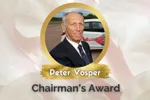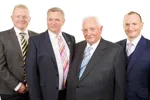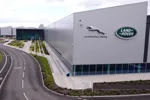In 2017, Sytner ended Pendragon’s 19-year reign at the top of the AM100. However, becoming the UK’s largest motor retailer by turnover was incidental to the Leicester-based group’s strategy, at least according to Darren Edwards, Sytner’s chief executive.
The events that pushed Sytner into the top spot were its acquisitions of two of the UK’s largest, most profitable independent used car supermarket chains – The Car People this month and CarShop last January. The acquisitions, which mean Sytner now has a used car supermarket division nearing £0.5 billion in sales from nine sites, is a clear signal of its intent to diversify and capitalise on a used car market still in growth, even as the new car market falters.
“As a company, we never set out to be the biggest, we just wanted to be the best,” said Edwards.
“The best brands, in the best locations, with the best premises, and employing the best people. It just so happens that this formula has meant we have become the biggest. Whether we stay the biggest or not, doesn’t really matter to us. What matters is that we stay the best.”
That ‘best’ involves a number of measures, including its relationships and awards from manufacturers, the profits it makes for shareholders, and staff satisfaction and retention. Edwards can point to some success with this strategy in the sackful of trophies the company and its individual dealerships have received in recent years. In 2017 alone, its accolades included: The Sunday Times Best Big Company to Work For; Mini’s Retailer of the Year; BMW’s Used Car Retailer of the Year; Dealer Group of the Year from leasing firm Alphabet; Ferrari Global Aftersales Dealer of the Year; Land Rover Sales Retailer of the Year; and Rolls-Royce Global Dealer of the Year.
Sytner makes more than £100 million in annual pre-tax profit, second only to Arnold Clark Automobiles, and its return-on-sales figure (2.3% in 2016) is double the industry average.
As shown by its Sunday Times ranking, Sytner’s workers rate their employer highly. Edwards said staff churn across the group is 15-20% and at management level it is below 5%.
He said he and his senior management team strive daily to maintain that reputation and performance in all areas.
“There are things that will come along and challenge that and that will need to be overcome, and our team will always work hard to take the business forward, learn and get better,” said Edwards.
Giving dealership staff a career to build on
At Sytner, everything starts with the employees, said Edwards. He believes the fact that it is an attractive company to work for helps it to find willing, capable employees, to whom it then gives the opportunity to build a career.
Sytner places a lot of emphasis on promotion from within and the executive board is a good example of the success of this policy. Edwards, who started his career as an apprentice bodyshop
technician, has been at Sytner since 2004, working his way up from dealer principal to franchise director, then divisional managing director for its Volkswagen businesses before promotion to his leadership role in 2014. Melvin Rogers, Sytner’s HR director, has been with the group since 2002 and was promoted to the board from the role of divisional HR manager.
Edwards said many companies display mission statements and corporate values that they do not actively live up to, but it was joining Sytner that showed him “this stuff – it matters”.
Sytner wants staff to remember five principles: treat yourself with honesty and integrity, respect colleagues and customers, work together and contribute, celebrate success and have fun.
The company runs different training schemes every year. One, the aspiring managers programme, takes about 16 people who have been identified by HR, divisional directors and heads of business as showing promise, based on their capabilities, attitudes and results.
Typically, by the end of the 12-month modular programme – which includes training on recruitment, performance management, leadership and financial controls – at least half of them have already been promoted to a management post, said Edwards.
“It doesn’t give them an automatic right to a role, but it gives them the confidence that they can apply and be seen as a credible candidate,” he added.
Employees without managerial aspirations are not left out by development programmes. Sytner is very engaged with the Institute of the Motor Industry, where Rogers is a board member. Last year, Sytner trialled an elite technicians programme for its specialist brand division. The scheme involved extensive IMI-accredited theory and practical diagnostic tests for more than 100 technicians, to motivate them to gain recognition of their skills and experience. Sytner’s three best technicians from each of Bentley, Porsche and Ferrari were entered into a final round in front of European executives from each carmaker. The winning technician from each brand won a trip to join Roger Penske (Sytner was acquired by his Penske Automotive Group in 2002) at an IndyCar racing weekend in the US.
New recruits for sales roles are typically sought outside motor retail. All starters go through an induction programme run by internal staff, which teaches them the history and expectations of Sytner, what they can expect in return, followed by role-specific training.
“Clearly we are a sales organisation, we still have to move on physical stock and we have to make sure we keep an eye on ageing stock, but fundamentally we are trying to train our sales people to help people make the decision to buy cars, rather than talking at 100mph and be that kind of motor-mouth traditional used car salesperson,” said Edwards.
He believes that while more people are moving towards getting their car priced, getting a finance quote or indeed buying the whole car online, “there will still be a lot of people, particularly in our segment which is premium, who want to come in and talk to somebody about what specifications are available”.
“If we can train our people to have that knowledge, but be customer-focused as well as performance-focused, we think we have a better chance of being relevant for longer, and of retaining people for longer as well.”
Edwards credits Sytner’s engagement and investment in its staff as one of the reasons why it has been able to grow so quickly.
“When we have had the opportunity to grow, we have always had good people ready. Many companies expand and have to find someone to run it, which is why it takes time to get the results. To have a good talent stream you can pull from is good.
“Buying a sizeable business is still challenging, but if you haven’t got that stream, you’re going to have to spend two or three years turning it around and you could have been doing something far more valuable with the people and the funds.”
Although the Leicester group HQ provides central support with HR, IT, property, F&I compliance and administration, Sytner runs its dealerships in individual divisions. It
separates Mercedes-Benz, BMW, Audi, Volkswagen and Jaguar Land Rover due to its scale of representation of those brands, and clusters smaller brands into shared units, such as the specialist division with Bentley, Porsche, Maserati and Ferrari.
Each division has its own director, financial controller, aftersales and sales support functions, plus at each dealership the dealer principals, or heads of business as Sytner calls them, have their own accountants on site. Much of the training is done regionally, by a team of 12 coaches based around the country.
Sytner prefers this structure because the divisional managers will know their brand’s peculiarities and initiatives intimately, and can share best practice between the sites, said Edwards.
“It can get a bit too vanilla if you have some group role on aftersales or sales which isn’t really close enough to an initiative,” said Edwards. The divisional directors report to Edwards, which he said means he is aware of any threats or risks almost the same day as the teams involved.
Many decisions are made at divisional and dealership level, Edwards said, and Sytner wants its managers to think of their unit as their business – if they were spending the money, what would they do?
It leads to innovation, he said, and great ideas percolate within the business, prompting others to refine them. The staff app has a function to submit suggestions to the board, and general managers can video-conference with each other easily to explore solutions.
“If you have 8,500 people thinking about better ways to do things, and have the structure that enables that to be supported, that’s how you become excellent,” said Edwards. He believes a business leader’s responsibility is to get others to have an input, develop a vision and bring it to life for the company.
At headquarters, Edwards liaises closely with Andrew Ogram, Sytner’s IT director, who joined as a desktop systems manager in 2005 and now heads a department of more than 50 people, including helpdesk operatives and software developers. Recruitment of developers has increased since Edwards became chief executive, attracting people from IT roles in
mainstream retailers. He said he wanted the group to develop its own technology to help drive it forward and fill the gaps left by its bought-in systems. One such example is Sytner’s Edoc system, which tracks
business in real time, keeping managers informed of deals done, profit margins, F&I profit, performance against budget and even performance of individual salespeople.
“Last year, we grew in volume and margin, and I think that’s unusual, just by having the focus that this gives us. can, if configured, send a note to the divisional directors when a poor deal has been done, so they can ring the head of business and ask why,” said Edwards.
Developers are also working on an employee review tool, which will allow a manager to diarise a monthly or twice-monthly performance review with every employee, and the employee can fill in their comments ahead of each review. The system also allows Edwards to record a motivating video update and send it to specific job functions and divisions through either their web browser or employee app.
Ogram said: “Our digital focus has been primarily on enabling employees to do things more quickly and more beneficially, rather than spending loads of time working on customer-facing websites to try to get people to buy cars. We feel that’s the manufacturer’s job. We are more about enabling people to become even better than they are.”
Edwards added: “We have more than 30 different applications that supplement the dealership management system (DMS). There’s lots of things the DMS can’t do for us that we need, so we do it ourselves.”
Infrastructure investment is not overlooked. The group renews all PCs, tablets and phones regularly and has invested “hundreds of thousands” in faster network connections.
Acquisition and diversification
Sytner also invests heavily in its showrooms. It is due to open a new five-acre complex for BMW/Mini in Sheffield, a multi-million-pound site that will have about 200 staff and 50 aftersales bays.
Its parent company, Penske Automotive Group, has been buying businesses in the US, Australia, Japan and mainland Europe, and Sytner has played a part in the expansion plan. Its takeover of Isaac Agnew in Northern Ireland in 2012 was followed by the acquisition of 11 businesses from struggling Clare James Automotive in 2016. Small bolt-on acquisitions have included Trainer BMW/Mini in Swansea.
Although the Clare James Automotive sites included a Volkswagen Group brand centre with Seat and Škoda franchises, such value brands are a minor part of the business. Frank Sytner and Lawrence Vaughan’s original strategy more than 20 years ago to grow with premium brands has proven to be the right one, said Edwards, as those brands have grown share as their cars have become more affordable through PCPs.
“We’ve always had a strategy of growing organically with the franchises that we have. We have no plans to go with any other franchises than we already hold, the premium franchises,” said Edwards. Aston Martin was the missing brand in its luxury brand portfolio, he said, and he was pleased to add that in Nottingham this year.
Moving into car supermarkets
The biggest sign of a new strategy to diversify was Sytner’s purchase of car supermarket chain CarShop at the start of 2017. It mirrored another Penske deal in the US, to buy five-site used car dealer CarSense, just a month earlier.
Edwards said the group had considered moving into motorcycles and trucks, but ruled that out based on return on capital calculations. However, the opportunity for scalable growth with CarShop, in a growing used car market, seemed clear. He said it took group revenues past £5bn in 2017.
Edwards said Sytner values the expertise of the original management teams of CarShop and The Car People, so is retaining them and creating a specific car supermarket division. Under Jonathan Dunkley, now managing director of Sytner’s car supermarket division and who ran CarShop prior to its acquisition, both brands will continue to trade as before, each with its own operations director: Kirk O’Callaghan for CarShop and Jonathan Allbones for The Car People, where he was sales and marketing director.
Edwards said the used car supermarket specialists have a different way of looking at things, and described Dunkley as “very forward-thinking”. Under Sytner’s wing, the used car division has a remit to expand over the next few years into new regions and build the largest car supermarket brand in the UK. It has already acquired two more plots of land.
Edwards said CarShop is “massively profitable” and an agile, “resilient” business – it can develop and more quickly trial ideas, such as guaranteed online part-exchange valuation as part of its no-haggle experience. Companies House records show The Car People is also a money-maker, earning £6.7m in pre-tax profit in its last financial year.
He added: “CarShop has been really successful. We’ve been delighted with the levels of profitability and professionalism of that business, so we started to research what else was around. Since the early days of Sytner when we grew, our strategy was to acquire businesses that were in good locations, well run and represent the right brands, and we’ve stood firm with that to build a business with nearly 150 franchises.”
Edwards said Sytner was looking for more high-quality used car businesses after buying CarShop, and The Car People, which turns over £225m annually, came to its notice. “It’s another fantastic business, with amazing locations, first class housekeeping and excellent management principles.
“It’s a different business to CarShop, but similar in many ways in terms of operator model, fixed price sales, no haggle, and a very transparent buying process and great website,” said Edwards.
He said the investments in car supermarkets mean Sytner can watch how such projects work and then consider whether to trial them within the franchised operations. Other benefits include stock provision. Sytner’s franchised business can help supplement CarShop’s and The Car People’s stock sources, and even replace the less profitable ones, by offering their unwanted part-exchanges, which tend to be premium, high-specification, low-mileage cars. CarShop specialises in the three- to six-year-old car market, and is less influenced to the nearly-new car market, which means it is less exposed to book drops and stock write-downs. After centralising its pre-delivery inspection (PDI) function, it now also provides aftersales, although at the moment it views this more as a retention tool than a profit stream, said Edwards.
He believes franchised dealerships have plenty of opportunity for increased used car sales and aftersales growth, if they can break the traditional working pattern and create capacity, such as through shifts and weekend working. Used car sales can improve by getting cars prepared quickly, priced right, and into the market, he said.
“It’s nine million cars going through the system annually, so there’s enough space for all of us.”
The group’s internal data tool, Sytnernet, helps managers to price cars and review them to keep pace with the market.
Asked about the relationship with the US-based parent, Edwards’ admiration for Penske’s success is evident.
“We owe our success in the UK largely to their investment. Roger Penske is a hugely inspirational person to work with. He has been in the business such a long time and in so many bits of it – manufacturing, truck rental, sales, motor racing. As a mentor he is brilliant. I go over with our CFO, Adam Collinson, to the board meeting once a quarter, and there’s always things you can pick up that people there are doing and vice versa to make the business stronger.”
A few heads of business have transferred to run dealerships in the US. Edwards said being part of a global business is another string to Sytner’s recruitment bow –
ambitious and talented people may have overseas opportunities, if they want them.
Although Sytner is now the biggest, the talk of further improvements, staff training and technological developments makes it clear its focus remains on becoming the best.

















Login to comment
Comments
No comments have been made yet.